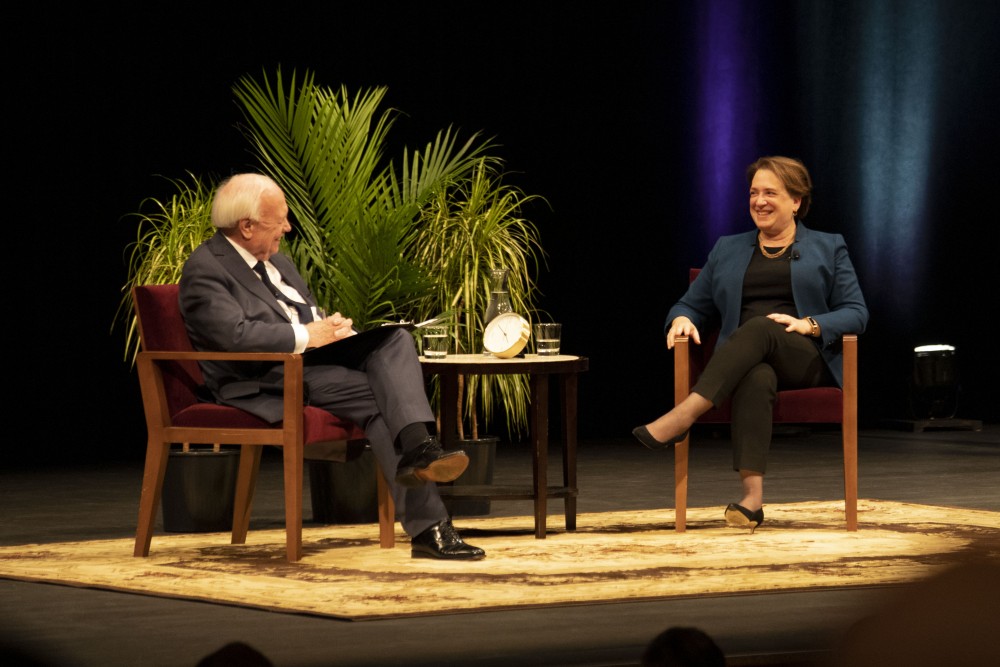United States Supreme Court Justice Elena Kagan spoke at the University of Minnesota Monday, where she discussed topics including her past experiences, diversity and female representation on the court.
Kagan is the fifth Supreme Court justice to speak in a series of lectures put on by the University’s Law School since 2014. A sold-out crowd at Northrop Auditorium welcomed her.
The lecture began with a greeting from President Joan Gabel and an introduction given by Law School Dean Garry Jenkins. University law professor Robert Stein brought Kagan to center stage and began the conversation.
Kagan described her love for the job and her colleagues and that she strives to make the right decisions as a justice.
“It’s a responsibility, it’s a privilege, but it’s also a whole lot of fun,” Kagan said.
Kagan made jokes during the talk and the crowd laughed as she described her experiences as a professor, solicitor general in the Department of Justice and eventually on the Supreme Court. She said there was a lot of trial and error in her first few years as a justice, and her relationship with her colleagues is strong despite their different opinions.
“My friend Justice [Antonin] Scalia said that if you take any of this personally, you’re in the wrong business,” Kagan said.
Stein asked her about her unusual reading of her dissenting opinion for a case on political gerrymandering, Rucho v. Common Cause. Kagan responded that she thought the court’s majority opinion was deeply wrong, and this prompted her to take action.
“When an issue is important for the country, and when you think that the majority is taking a very wrong turn, I think that’s the time when you sort of take a symbolic action of [reading] dissent from the bench.”
Kagan is one of three women justices on the court and the fourth woman to ever be on the court.
“I think that it’s important, but I actually don’t think that there’s much of a female perspective,” Kagan said. “I mean, women come in all varieties, and you can find women all over the legal spectrum in terms of their political philosophy.”
Kagan said the real importance of having women and diverse people on the court is to have the respect and representation of Americans.
However, there was one case on the Supreme Court that was divided by gender while she was solicitor general, she said. The case involved a 13-year-old girl who was strip searched by male high school administrators. Kagan described how Supreme Court Justice Ruth Bader Ginsburg seemed emotionally affected by the case, but her male colleagues acted differently.
“They were joking about it and laughing about it,” Kagan said. “But the next day, the court went back, and who knows what happened behind closed doors, but they came out the way that Justice Ginsburg wanted them to, saying that this was an unconstitutional search.”
When asked about her thoughts on former Supreme Court Justice Thurgood Marshall, Kagan said she was lucky to clerk for him and called him an iconic figure.
“I think he was the greatest lawyer of the Twentieth century,” Kagan said. “He and the people he worked with [broke] down the … system of segregation.”
Kagan ended by saying she struggled in her first year of law school and didn’t plan on being a Supreme Court justice.
“It’s so much luck, it’s like a lightning strike really,” Kagan said of her ascension to the Supreme Court.
Regent Michael Hsu, who was in attendance, said Kagan was funnier than he expected her to be.
“It’s one of the events I look forward to every year,” he said. “I mean, how often do you get to see [a] Supreme Court justice?”
Stein said his interview with Kagan went well, considering that he’s known her for years.
“I know Justice Kagan and I know she’ll say a lot of good things and bring a lot of humor,” Stein said. “We’ve had several justices in the past for this series, and Justice Kagan was outstanding.”







